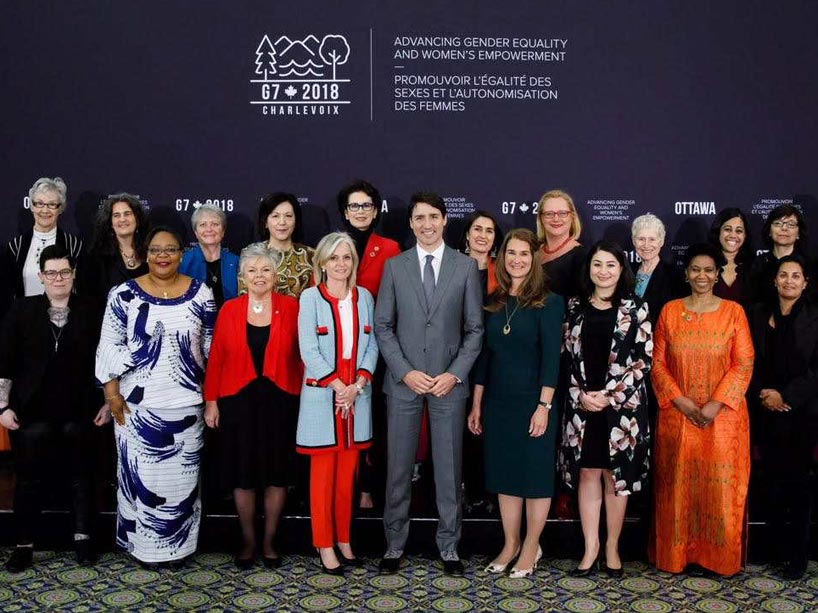Farrah Khan joins G7 gender equality advisory council

Photo: Farrah Khan (back row, fifth from the right) with Prime Minister Justin Trudeau and members of the G7 gender equality advisory council, which met in Ottawa at the end of April in the run up to the G7 meeting in June.
Farrah Khan—manager of Ryerson’s Office of Sexual Violence Support and Education, and a nationally recognized advocate/educator—has been named to the Gender Equality Council for Canada’s G7 Presidency (external link) . The council’s goal is to promote gender equality and gender-based analysis among the G7 countries … and Khan hasn’t lost sight of her activist roots.
“What I appreciated was that they asked not only people who have been seen in the public sphere on a global scale, but also grassroots activists,” said Khan. “That’s what I was told when Prime Minister Trudeau called. … I think it’s important to have a mix of people that have extensive experience providing high-level feedback on policy and practice, with people doing frontline work.”
Co-chaired by Melinda Gates and Isabelle Hudon, the council’s 19 members include a range of activists, politicians, and businesspeople, including respected names like Roberta Jamieson and Malala Yousafzai. The council will recommend concrete actions for the G7 to advance gender equality and women’s empowerment across all sectors of its work.
“My hope is that gender is not a side issue—it’s a central issue” said Khan. “From climate change to leadership to budgets, every issue intersects with gender. We want to ensure that that 51 per cent of the world’s population is not left out of key political and economic decisions.”
As co-chair of the Council’s Gender Equality and Women's Empowerment working group along with Katja Iverson from Women Deliver, Khan’s priorities will include reproductive justice, gender-responsive budgeting and unpaid care work. “Women still take—and are disproportionately affected by—the burden of unpaid care work at home and in society at large. This affects their economic security, their ability to engage in leadership and decision-making roles, and their ability to have control over their own health and well-being, among other things.”
She also hopes the committee will encourage governments to look at all major social issues from an intersectional perspective. “We are hoping that the G7 can commit to ensuring equal pay for work of equal value. Globally women earn 23 per cent less than men, and we know that Indigenous women, Black women and women of colour earn even less. Everything is gendered, and every conversation needs to have that lens of how issues of race, gender and geography impact the way in which people experience policy.”
Khan has taught across North America on subjects including gender, sexual violence, consent, and forced marriage. She is co-chair of Ontario’s first permanent Roundtable on Violence Against Women, whose achievements include advocating for consent in the curriculum. “We worked as a coalition beyond what is traditionally seen as a violence-against-women movement,” said Khan. “It is a collaboration of Indigenous women’s groups, LGBTQ organizations and labour movements.”
At Ryerson, Khan oversees university-wide activities related to awareness, education, training, support and response to sexual violence in the Ryerson community, including the newly created bystander intervention program for both students and staff, the #TakeCareRU campaign.
Looking ahead to the G7 council, Khan said, “For me, the amazing part of this has been meeting feminists from across the world: seeing what the priorities are, and how we’re linked, and making sure those conversations aren’t just about gender, but have an intersectional lens.”